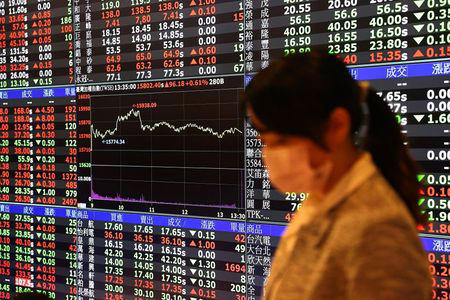Asian markets exhibited a mixed performance on Wednesday, characterized by varying reactions across different regions in response to geopolitical tensions and economic factors. The day began with significant declines in Taiwan and China, spurred by controversial remarks from former U.S. President Donald Trump regarding Taiwan’s defense obligations to the United States. Trump’s suggestion that Taiwan should reimburse the U.S. for defense supplies injected uncertainty into markets, particularly concerning the delicate relationship between Taiwan and mainland China.
In Taiwan, the Taiwan Weighted index fell by 0.3% as investors reacted to the implications of Trump’s statements on the island’s geopolitical and economic stability. Similarly, mainland Chinese markets also experienced downturns, with the Shanghai Shenzhen CSI 300 and Shanghai Composite indexes slipping by 0.1% and 0.5%, respectively. Hong Kong’s Hang Seng Index dipped 0.2%, reflecting cautious sentiment amid heightened geopolitical tensions.
Meanwhile, broader market losses across Asia were cushioned by a strong performance on Wall Street, where the Dow Jones Industrial Average surged nearly 2% to achieve record highs. This bullish sentiment in U.S. markets was driven by optimism surrounding potential interest rate cuts by the Federal Reserve, prompting investors to pivot towards economically sensitive sectors such as industrials and materials, while reducing exposure to technology stocks.
Trump’s comments on Taiwan reverberated beyond immediate market reactions, influencing investor sentiment across the region, particularly in sectors heavily reliant on technology. Semiconductor stocks, crucial to Asia’s tech sector, saw notable declines as market participants awaited key earnings reports from industry giants like ASML Holding NV and Taiwan Semiconductor Manufacturing Company (TSMC) later in the week. These companies are pivotal to the global supply chain for semiconductors, which has experienced robust demand due to increasing applications in artificial intelligence and other advanced technologies.
The repercussions of Trump’s remarks highlighted the sensitivity of Asian markets to geopolitical developments, particularly those involving the U.S. and China. Beijing’s longstanding position advocating for the reunification of Taiwan with the mainland adds further complexity to the geopolitical landscape, impacting investor confidence and market stability in the region.
In response to Trump’s statements, TSMC, one of Taiwan’s leading semiconductor manufacturers, saw its shares decline by approximately 2%, contributing to modest gains in Japan’s Nikkei 225 index, which rose 0.2%. In contrast, South Korea’s KOSPI index edged down by 0.2% as tech stocks faced selling pressure amid geopolitical uncertainties.
However, markets less exposed to the technology sector, such as Japan’s TOPIX index, advanced by 0.5%, reflecting positive sentiment driven by expectations of forthcoming interest rate cuts and domestic economic resilience. Australia’s ASX 200 index surged by 1% to reach record highs, buoyed by strong investor confidence in the country’s economic outlook and resource sectors.
Looking ahead, futures for India’s Nifty 50 index pointed to a positive opening, underscoring continued bullish sentiment in Indian markets fueled by robust economic growth prospects and investor optimism.
Overall, while Trump’s remarks introduced volatility into Asian markets, broader economic factors such as central bank policies, corporate earnings, and geopolitical tensions continue to shape investor sentiment and market dynamics across the region.
